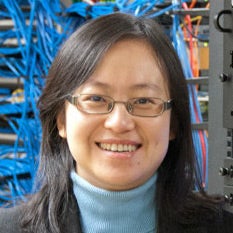University of Rhode Island Engineering Professor Yan (Lindsay) Sun has been elevated to the rank of Fellow by the Institute of Electrical and Electronics Engineers (IEEE).
Fellow is the highest grade of institute membership. Sun was one of 296 members, out of 423,000 worldwide, who were approved for the distinction by the IEEE Board of Directors for 2019.
The honor recognizes Sun’s contributions to trust modeling and statistical signal processing for cyber-physical security.
“We are so proud of all the outstanding research and scholarly work that Yan has achieved,” said Haibo He, chair of URI’s Department of Electrical, Computer and Biomedical Engineering.
Sun, who is the director of URI’s Network Security and Trust (NEST) Laboratory, is considered a pioneer on addressing the power grid security challenges from the holistic view of information, signal processing, and networking.
Her research team was the first to discover two potential cyber-physical attacks: the joint attack and the sequential attack, in which the attackers target both transmission lines and substations, and carefully orchestrate the order of attacks at different operation points of a power system.
Q & A with Professor Sun
Q: Why does the field of cyber security interest you?
A: We learned from the Equifax breach, in which sensitive information of 143 million Americans was exposed, that there is an urgent need to protect data, people and the national infrastructure. The U.S. power grid is attacked nearly 100 times a year. There is also a new pacemaker hack that can put malware directly on a device.
My colleagues and I are driven by a sense of urgency to combat these threats to our security. This field is exciting because there is always a need for innovation.
Q: What are a couple of your proudest achievements at URI?
A: There are two recent accomplishments for which I’m especially proud. I’m a co-principal investigator on a project titled, “Toward a Reliable and Resilient Smart Grid: From Early Warning Detection to Grid Behavior Analysis,” which is being funded by a $1.9 million grant from the Office of Naval Research (ONR).
I also won the 2018 Premium Award for Best Paper in the category of Wireless Sensor Systems from the Institution of Engineering and Technology (IET). The paper was titled, “Hybrid wireless sensor networks: a reliability, cost and energy-aware approach.”
Q: What are your career goals in the next few years?
A: For research, I will continue what I am doing right now. The goal is to protect critical infrastructure from cyber-physical attacks. At the same time, I will work with my colleagues on workforce development, hoping that the field of cyber-physical system security will attract more talent. I also want to promote the accomplishments of female engineers and inspire young girls to pursue an academic and professional career in engineering.

